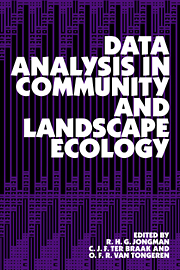Book contents
2 - Data collection
Published online by Cambridge University Press: 11 October 2009
Summary
Data collection, not an isolated or undirected activity
In this chapter several statistical methodological aspects of community and landscape ecology will be discussed. The advanced methods of analysis dealt with in this book are of great use to the researcher of ecological communities. One would expect that technical knowledge of these methods offers sufficient assurance for an objective and efficient application of these methods. However this is not the case. The advanced character of the methods and the complexity of ecological research can cause the researcher to become caught up in unexpected methodological pitfalls.
Whole filing-cabinets full of information about the composition of the flora and fauna in a certain area do not necessarily offer a useful starting point for research. Samples taken from a vegetation in a certain area to establish the natural values of that area must be differently placed (in time and space) from samples taken to detect the disturbing influences of nearby industries. In the first case, one could select the sampling units randomly from the area to be studied. In the second case, it could be far better to sample at systematically determined distances from the industrial plant. The purpose of a research project puts demands on the way in which data are collected. A set of data suitable for one purpose may be totally unsuitable for another.
- Type
- Chapter
- Information
- Data Analysis in Community and Landscape Ecology , pp. 10 - 28Publisher: Cambridge University PressPrint publication year: 1995
- 6
- Cited by



